美国文学多部作品的翻译及赏析
- 格式:doc
- 大小:103.00 KB
- 文档页数:29

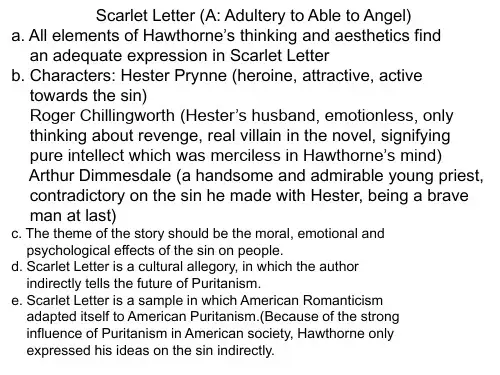
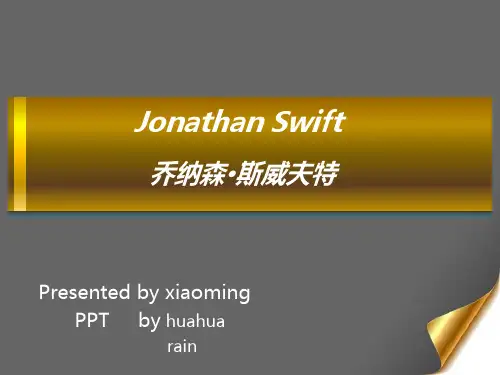
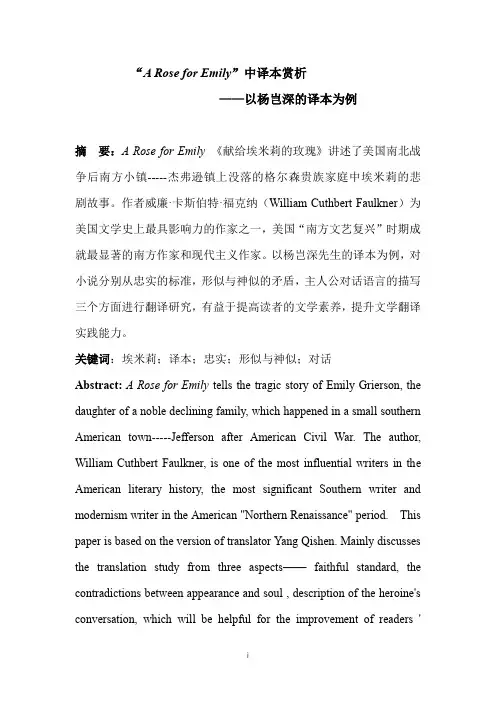
“A Rose for Emily”中译本赏析——以杨岂深的译本为例摘要:A Rose for Emily 《献给埃米莉的玫瑰》讲述了美国南北战争后南方小镇-----杰弗逊镇上没落的格尔森贵族家庭中埃米莉的悲剧故事。
作者威廉·卡斯伯特·福克纳(William Cuthbert Faulkner)为美国文学史上最具影响力的作家之一,美国“南方文艺复兴”时期成就最显著的南方作家和现代主义作家。
以杨岂深先生的译本为例,对小说分别从忠实的标准,形似与神似的矛盾,主人公对话语言的描写三个方面进行翻译研究,有益于提高读者的文学素养,提升文学翻译实践能力。
关键词:埃米莉;译本;忠实;形似与神似;对话Abstract: A Rose for Emily tells the tragic story of Emily Grierson, the daughter of a noble declining family, which happened in a small southern American town-----Jefferson after American Civil War. The author, William Cuthbert Faulkner, is one of the most influential writers in the American literary history, the most significant Southern writer and modernism writer in the American "Northern Renaissance" period. This paper is based on the version of translator Yang Qishen. Mainly discusses the translation study from three aspects—— faithful standard, the contradictions between appearance and soul , description of the heroine's conversation, which will be helpful for the improvement of readers 'literary accomplishment, and contributes to the well study of literary translation.Key words:Emily; version; faithfulness; contradictions between appearance and soul; conversation前言A Rose for Emily《献给埃米莉的玫瑰》为南方文学鼻祖威廉•福克纳(William Faukner)所创作的著名短篇小说,1930年4月发表时被誉为最负盛名的小说。
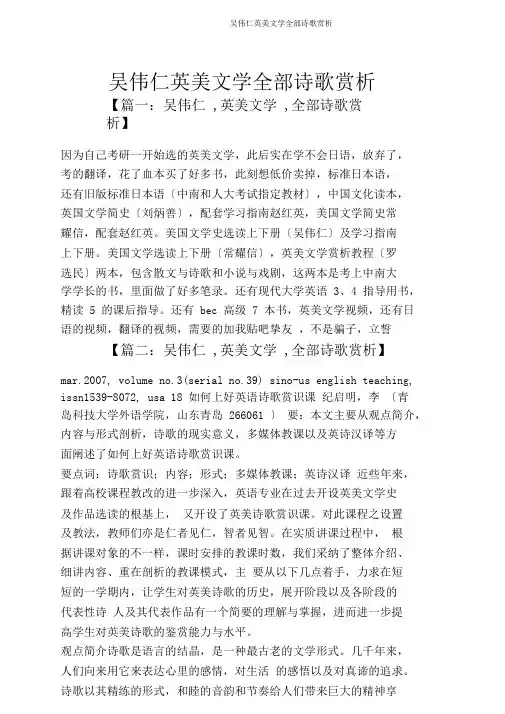
吴伟仁英美文学全部诗歌赏析【篇一:吴伟仁 ,英美文学 ,全部诗歌赏析】因为自己考研一开始选的英美文学,此后实在学不会日语,放弃了,考的翻译,花了血本买了好多书,此刻想低价卖掉,标准日本语,还有旧版标准日本语〔中南和人大考试指定教材〕,中国文化读本,英国文学简史〔刘炳善〕,配套学习指南赵红英,美国文学简史常耀信,配套赵红英。
美国文学史选读上下册〔吴伟仁〕及学习指南上下册。
美国文学选读上下册〔常耀信〕,英美文学赏析教程〔罗选民〕两本,包含散文与诗歌和小说与戏剧,这两本是考上中南大学学长的书,里面做了好多笔录。
还有现代大学英语 3、4 指导用书,精读 5 的课后指导。
还有 bec 高级 7 本书,英美文学视频,还有日语的视频,翻译的视频,需要的加我贴吧挚友,不是骗子,立誓【篇二:吴伟仁 ,英美文学 ,全部诗歌赏析】mar.2007, volume no.3(serial no.39) sino-us english teaching, issn1539-8072, usa 18 如何上好英语诗歌赏识课纪启明,李〔青岛科技大学外语学院,山东青岛 266061 〕要:本文主要从观点简介,内容与形式剖析,诗歌的现实意义,多媒体教课以及英诗汉译等方面阐述了如何上好英语诗歌赏识课。
要点词:诗歌赏识;内容;形式;多媒体教课;英诗汉译近些年来,跟着高校课程教改的进一步深入,英语专业在过去开设英美文学史及作品选读的根基上,又开设了英美诗歌赏识课。
对此课程之设置及教法,教师们亦是仁者见仁,智者见智。
在实质讲课过程中,根据讲课对象的不一样,课时安排的教课时数,我们采纳了整体介绍、细讲内容、重在剖析的教课模式,主要从以下几点着手,力求在短短的一学期内,让学生对英美诗歌的历史,展开阶段以及各阶段的代表性诗人及其代表作品有一个简要的理解与掌握,进而进一步提高学生对英美诗歌的鉴赏能力与水平。
观点简介诗歌是语言的结晶,是一种最古老的文学形式。
![[汇总]《飘》各翻译版本对比论文](https://uimg.taocdn.com/acf3b057bf1e650e52ea551810a6f524cdbfcb58.webp)
《飘》翻译评析(一)作者简介玛格丽特·米切尔,美国现代著名女作家,曾获文学博士学位,担任过《亚特兰大新闻报》的记者。
1937年她获得普利策奖。
1939年获纽约南方协会金质奖章。
1949年,她不幸被车撞死。
她短暂的一生并未留下太多的作品,但只一部《飘》足以奠定她在世界文学史中不可动摇的地位。
(二)内容简介《飘》是一部描写爱情的小说。
这本书以美国南北战争时期的南方社会为背景,以郝思嘉为主线,描写了几对青年的爱情纠葛。
作者站在同情农奴主的立场上,描写了美国南北战争和战后重建的情况,情节生动、笔调幽默,具有南方浪漫传奇小说的传统。
米切尔以她女性的细腻,精确地把握了人物复杂的心理活动,成功地塑造了郝思嘉这一复杂的人物形象。
小说的构思极富浪漫情调,人物和场景的描写细腻生动,语言优美生动,对白个性化,使得整部作品极具魅力。
本书在描绘人物生活与爱情的同时,勾勒出南北双方在政治,经济,文化各个层次的异同,具有浓厚的史诗风格,堪称美国历史转折时期的真实写照,同时也成为历久不衰的爱情经典。
(三)译者简介(1)傅东华(1893-1971),本姓黄,过继母舅,改姓傅,又名则黄,笔名伍实、郭定一、黄约斋、约斋,金华曹宅镇大黄村人。
1912年,上海南洋公学中学部毕业,次年进中华书局当翻译员,开始发表短篇小说。
1914年起,先后在东阳中学、北京平民大学附属中学、北京高等师范教英语。
译有西班牙塞万提斯《唐·吉诃德》,英约翰·弥尔顿《失乐园》,美德来塞《珍妮姑娘》,古希腊荷马《伊利亚特》等。
(2)李野光,原名李光鉴,湖南涟源人。
中共党员。
1951年毕业于北京大学西方语言文学系。
历任湖南春元中学和建国中学教师,北京育英中学教师,中央对外文化部门科长,中国社会科学院外国文学研究所《世界文学》编辑部主任。
美国爱荷华大学高级研究中心奥伯曼研究员。
1942年开始发表作品。
1979年加入中国作家协会。
妻子戴侃也是英语翻译家。
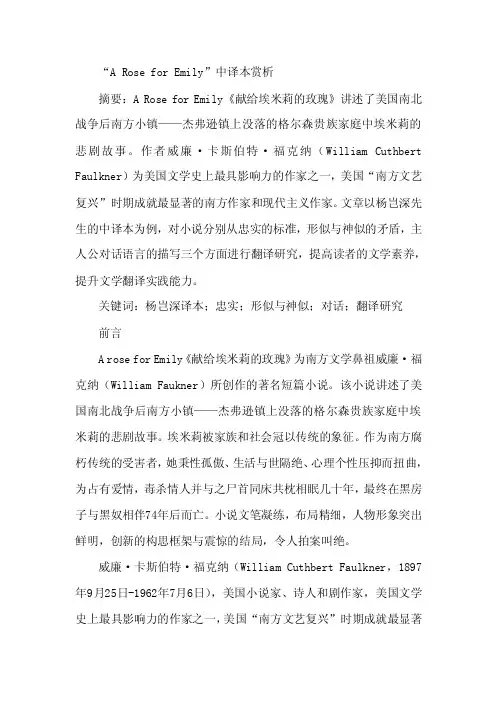
“A Rose for Emily”中译本赏析摘要:A Rose for Emily《献给埃米莉的玫瑰》讲述了美国南北战争后南方小镇——杰弗逊镇上没落的格尔森贵族家庭中埃米莉的悲剧故事。
作者威廉·卡斯伯特·福克纳(William Cuthbert Faulkner)为美国文学史上最具影响力的作家之一,美国“南方文艺复兴”时期成就最显著的南方作家和现代主义作家。
文章以杨岂深先生的中译本为例,对小说分别从忠实的标准,形似与神似的矛盾,主人公对话语言的描写三个方面进行翻译研究,提高读者的文学素养,提升文学翻译实践能力。
关键词:杨岂深译本;忠实;形似与神似;对话;翻译研究前言A rose for Emily《献给埃米莉的玫瑰》为南方文学鼻祖威廉·福克纳(William Faukner)所创作的著名短篇小说。
该小说讲述了美国南北战争后南方小镇——杰弗逊镇上没落的格尔森贵族家庭中埃米莉的悲剧故事。
埃米莉被家族和社会冠以传统的象征。
作为南方腐朽传统的受害者,她秉性孤傲、生活与世隔绝、心理个性压抑而扭曲,为占有爱情,毒杀情人并与之尸首同床共枕相眠几十年,最终在黑房子与黑奴相伴74年后而亡。
小说文笔凝练,布局精细,人物形象突出鲜明,创新的构思框架与震惊的结局,令人拍案叫绝。
威廉·卡斯伯特·福克纳(William Cuthbert Faulkner,1897年9月25日-1962年7月6日),美国小说家、诗人和剧作家,美国文学史上最具影响力的作家之一,美国“南方文艺复兴”时期成就最显著的南方作家和现代主义作家。
他一生共创作了19部长篇小说与120多篇短篇小说,其中15部长篇与绝大多数短篇的故事都发生在约克纳帕塔法县,称为“约克纳帕塔法(Yocanapatafa)世系”。
因“对当代美国小说做出了强有力的和艺术上无与伦比的贡献”,福克纳成为1949年诺贝尔文学奖得主。
《献给埃米莉的玫瑰》具有沉重的悲剧感和哥特式小说传统,情节组织超越了时间顺序,艺术手法独特。
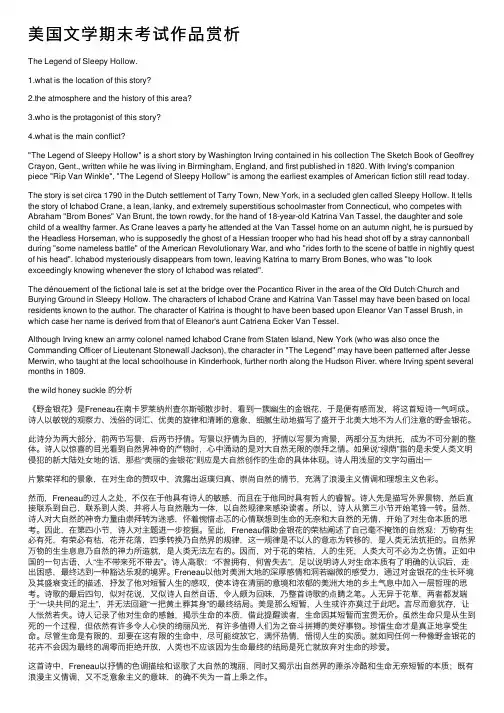
美国⽂学期末考试作品赏析The Legend of Sleepy Hollow.1.what is the location of this story?2.the atmosphere and the history of this area?3.who is the protagonist of this story?4.what is the main conflict?"The Legend of Sleepy Hollow" is a short story by Washington Irving contained in his collection The Sketch Book of Geoffrey Crayon, Gent., written while he was living in Birmingham, England, and first published in 1820. With Irving's companion piece "Rip Van Winkle", "The Legend of Sleepy Hollow" is among the earliest examples of American fiction still read today. The story is set circa 1790 in the Dutch settlement of Tarry Town, New York, in a secluded glen called Sleepy Hollow. It tells the story of Ichabod Crane, a lean, lanky, and extremely superstitious schoolmaster from Connecticut, who competes with Abraham "Brom Bones" Van Brunt, the town rowdy, for the hand of 18-year-old Katrina Van Tassel, the daughter and sole child of a wealthy farmer. As Crane leaves a party he attended at the Van Tassel home on an autumn night, he is pursued by the Headless Horseman, who is supposedly the ghost of a Hessian trooper who had his head shot off by a stray cannonball during "some nameless battle" of the American Revolutionary War, and who "rides forth to the scene of battle in nightly quest of his head". Ichabod mysteriously disappears from town, leaving Katrina to marry Brom Bones, who was "to look exceedingly knowing whenever the story of Ichabod was related".The dénouement of the fictional tale is set at the bridge over the Pocantico River in the area of the Old Dutch Church and Burying Ground in Sleepy Hollow. The characters of Ichabod Crane and Katrina Van Tassel may have been based on local residents known to the author. The character of Katrina is thought to have been based upon Eleanor Van Tassel Brush, in which case her name is derived from that of Eleanor's aunt Catriena Ecker Van Tessel.Although Irving knew an army colonel named Ichabod Crane from Staten Island, New York (who was also once the Commanding Officer of Lieutenant Stonewall Jackson), the character in "The Legend" may have been patterned after Jesse Merwin, who taught at the local schoolhouse in Kinderhook, further north along the Hudson River, where Irving spent several months in 1809.the wild honey suckle 的分析《野⾦银花》是Freneau在南卡罗莱纳州查尔斯顿散步时,看到⼀簇幽⽣的⾦银花,于是便有感⽽发,将这⾸短诗⼀⽓呵成。
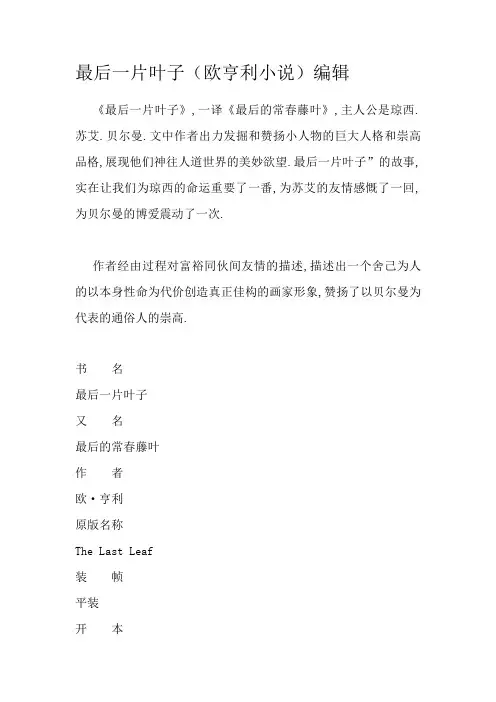
最后一片叶子(欧亨利小说)编辑《最后一片叶子》,一译《最后的常春藤叶》,主人公是琼西.苏艾.贝尔曼.文中作者出力发掘和赞扬小人物的巨大人格和崇高品格,展现他们神往人道世界的美妙欲望.最后一片叶子”的故事,实在让我们为琼西的命运重要了一番,为苏艾的友情感慨了一回,为贝尔曼的博爱震动了一次.作者经由过程对富裕同伙间友情的描述,描述出一个舍己为人的以本身性命为代价创造真正佳构的画家形象,赞扬了以贝尔曼为代表的通俗人的崇高.书名最后一片叶子又名最后的常春藤叶作者欧·亨利原版名称The Last Leaf装帧平装开本161作者简介▪生平▪手段2作品内容3作品原文▪中文原文▪英文原文4作品赏析作者简介编辑生平1862年9月11日,美国最有名的短篇小说家之——欧·亨利(O.Henry)出生于美国北卡罗来纳州有个名叫格林斯波罗的小镇.曾被评论界誉为曼哈顿桂冠散文作家和美国现代短篇小说之父.1862年他出身于美国北卡罗来纳州格林斯波罗镇一个医师家庭.父亲是大夫.他原名威廉·西德尼·波特(William Sydney Porter).他所受教导不久不多,15岁便开端在药房当学徒,20岁时因为健康原因去德克萨斯州的一个牧场当了两年牧牛人,积聚了对西部生涯的亲自经验.1884年今后做过管帐员.地盘局处事员.消息记者.此后,他在德克萨斯做过不合的工作,包含在奥斯汀银行当出纳员.他还办过一份名为《滚石》的滑稽周刊,并在休斯敦一家日报上揭橥滑稽小说和妙闻逸事.1887年,亨利娶亲并生了一个女儿. 合法他的生涯颇为安定之时,却产生了一件转变他命运的工作.1896年,奥斯汀银行指控他在任职时代盗用资金.他为了回避受审,逃往洪都拉斯.1897年,后因回家探视病危的老婆被捕入狱,判处5年徒刑.在狱中曾担任配药师,他创作第一部作品的原由是为了给女儿买圣诞礼品,但基于罪人的身份不敢应用真名,乃用一部法国药典的编者的名字作为笔名,在《麦克吕尔》杂志揭橥.1901年,因“行动优越”提前获释,来到纽约专事写作. 合法他的创作力最兴旺的时刻,健康状况却开端恶化,于1910年病逝.欧·亨利在精确十年的时光内创作了短篇小说共有300多篇,收入《白菜与国王》(1904)[其独一一部长篇,作者经由过程四五条并行的线索,试图描述出一幅辽阔的画面,在写法上有它的新鲜之处.不过从另一方面看,小说章与章之间的内涵接洽不敷慎密,各有自力的内容].《四百万》(1906).《西部之心》(1907).《市声》(1908).《滚石》(1913)等集子,个中以描述纽约曼哈顿市平易近生涯的作品为最有名.他把那儿的街道.小饭店.破旧的公寓的氛围衬着得十分传神,故有“曼哈顿的桂冠诗人”之称.他曾以骗子的生涯为题材,写了很多短篇小说.作者妄图标明道貌岸然的上流社会里,有很多人就是高等的骗子,成功的骗子.欧·亨利对社会与人生的不雅察和剖析其实不深入,有些作品比较浅陋,但他平生困窘,常与掉意崎岖潦倒的小人物安危与共,又能以标新立异的艺术手段表示他们庞杂的情感.他的作品构想新鲜,说话滑稽,终局经常出人不测;又因描述了浩瀚的人物,富于生涯情趣,被誉为“美国生涯的滑稽百科全书”.是以,他最一般的短篇小说如《爱的就义》(A Service of Love).《警员与赞扬诗》(The Cop and the Anthem).《带家具出租的房间》(The Furnished Room).《麦琪的礼品》(The Gift of the Magi).《最后的常春藤叶》(The Last Leaf)等都可列入世界优良短篇小说之中.他的文字活泼活泼,善于应用双关语.讹音.谐音和旧典新意,妙趣横生,被喻为[含泪的微笑].他还以精确的细节描述,制作与再现氛围,特殊是大都邑夜生涯的氛围.手段欧·亨利还以善于结尾有名遐迩,美国文学界称之为“欧·亨利式的结尾”他善于戏剧性地设计情节,埋下伏笔,作好铺垫,勾画抵触,最后在结尾处忽然让人物的心理情境产生出人料想的变更,或使主人公命运陡然逆转,使读者觉得名顿开,柳暗花明,既在料想之外,又在情理之中,不由拍案称奇,从而造成独特的艺术魅力.有一种被称为“含泪的微笑”的独特艺术作风.欧·亨利把小说的魂魄全都凝集在结尾部分,让读者在前的似乎是平庸无奇的而又是滑稽滑稽的娓娓动人的描述中,不知不觉地进入作者精心设置的迷宫,直到最后,忽如电光一闪,才照亮了先前隐蔽着的一切,仿佛在和读者捉迷藏,或者在玩弄障眼法,给读者最后一个惊喜.在欧·亨利之前,其他短篇小说家也已经如许测验测验过这种出乎料想的终局.但是欧·亨利对此应用得更为经常,更为天然,也更为纯熟老到.作品内容编辑穷画家琼珊得了宿疾,在病房里看着窗外对面树上的常春藤叶子不竭被风吹落,她认为最后一片叶子的凋零代表本身的逝世亡,于是她掉去了生计的意志.大夫认为再如许下去琼珊会逝世去.贝尔曼,一个巨大的画家,在听完苏艾讲述室友琼珊的工作后,夜里冒着暴雨,居心灵的画笔划出了一片“永不凋零”的常春藤叶,让琼珊重拾对性命的欲望,而本身却是以患上肺炎,逝世了.作品原文编辑中文原文在华盛顿广场西面的一个小区里,街道仿佛发了狂似的分成了很多叫做“小路”的小胡同.这些“小路”形成很多独特的角度和曲线.一条街有时本身本身就交叉了不止一次.有一回一个画家发明这条街有他的宝贵之处.假如一个商人去收颜料.纸张和画布的账款,在这条街上迂回曲折.大兜圈子的时刻,忽然碰着一毛钱也充公到.白手而归的本身,那才有意思呢!所以,不久之后很多画家就探索到这个古色古喷鼻的老格林尼治村来了.他们逛来逛去,追求朝北的窗户.18世纪的三角墙.荷兰式的阁楼,以及低廉的房租.然后,他们又从第六街买来一些锡蜡杯子和一两只烘锅,构成了一个“艺术区”.苏艾和琼珊在一座矮墩墩的的三层楼砖屋的顶楼设立了她们的画室.“琼珊”是琼西的昵称.她俩一个来自缅因州,一个是加利福尼亚州人.她们是在德尔蒙戈饭店吃客饭时碰着的,彼此一谈,发明她们对艺术.饮食.衣着的口胃十分相投,成果便结合租下了那间画室.那是5月里的事.到了11月,一个冷淡的.肉眼看不见的.大夫们叫做“肺炎”的不速之客,在艺术区里静静地浪荡,用他冰冷的手指头这里碰一下那边碰一下.在广场东头,这个损坏者堂堂皇皇地踏着大步,一会儿就击倒几十个受害者,可是在迷宫一样.狭小而铺满青的“胡同”里,他的程序就慢了下来.肺炎师长教师不是一个你们心目中抱不平的老绅士.一个身子单薄,被加利福尼亚州的西风刮得没有赤色的弱女子,本来不该该是这个有着红拳头的.呼吸急促的老家伙打击的对象.然而,琼西却遭到了打击;她躺在一张油漆过的铁床上,一动也不动,凝睇着小小的荷兰式玻璃窗外对面砖房的空墙.一天凌晨,谁人劳碌的大夫扬了扬他那毛茸茸的灰白色眉毛,把苏叫到外边的走廊上.“我看,她的病只有一成欲望,”他说,一面把体温表里的水银甩下去,“这一成欲望在于她本身要不要活下去.人们不想活,宁愿照料殡仪馆的生意,这种精力状况使医药束手无策.你的这位蜜斯满肚子认为本身不会好了.她有什么苦衷吗?”“她——她欲望有一天可以或许去画那不勒斯海湾.”苏艾说.“绘画?——别瞎扯了!她心里有没有值得想两次的工作.比方说,[1]汉子?”“汉子?”苏艾像吹口琴似的扯着嗓子说,“汉子岂非值得... ...不,大夫,没有如许的事.”“能达到的全体力气去治疗她.可如果我的病人开端算计会有若干辆马车送她出丧,我就得把治疗的后果减掉落百分之五十.只要你能设法主意让她对冬季大衣袖子的时新式样觉得兴致而提出一两个问题,那我可以向你包管把医好她的机遇从十分之一进步到五分之一.”大夫走后,苏艾走进工作室里,把一条日本餐巾哭成一团湿.后来她手里拿着画板,装做精力焕发的样子走进琼西的房子,嘴里吹着爵士音乐调子.琼西躺着,脸朝着窗口,被子底下的身材纹丝不动.苏认为她睡着了,赶忙停滞吹口哨.她架好画板,开端给杂志里的故事画一张钢笔插图.年青的画家为了摊平通向艺术的道路,不克不及不给杂志里的故事画插图,而这些故事又是年青的作家为了摊平通向文学的道路而不克不及不写的.苏艾正在给故事主人公,一个爱达荷州牧人的身上,画上一条马匹博览会穿的时兴马裤和一片单眼镜时,溘然听到一个反复了几回的低微的声音.她快步走到床边.琼珊的眼睛睁得很大.她望着窗外,数着……倒过来数.“12,”她数道,歇了一会又说,“11”,然后是“10”,和“9”,接着几乎同时数着“8”和“7”.苏艾关心地看了看窗外.那儿有什么可数的呢?只见一个空荡昏暗的院子,20英尺以外还有一所砖房的空墙.一棵老极了的常春藤,枯萎的根纠结在一块,枝干攀在砖墙的半腰上.秋天的北风把藤上的叶子差不久不多全都吹掉落了,几乎只有光秃的枝条还缠附在剥落的砖块上.“什么,友爱的?”苏问道.“6,”琼西几乎用私语低声说道,“它们如今越落越快了.三天前还有差不久不多一百片.我数得头都疼了.但是如今好数了.又掉落了一片.只剩下五片了.”“五片什么,友爱的.告知你的苏艾.”“叶子.常春藤上的.等到最后一片叶子掉落下来,我也就该去了.这件事我三天前就知道了.岂非大夫没有告知你?”“哟,我从来没听过这么荒谬的话,”苏艾满不在乎地说,“那些破常春藤叶子同你的病有什么相关?你以前不是很爱好这棵树吗?得啦,你这个调皮的姑娘.不要说傻话了.瞧,大夫今天凌晨还告知我,说你敏捷痊愈的机遇是,让我想想他是怎么说的---他说你好的几率有十比一!噢,那的确和我们在纽约坐电车或者走过一座新楼房的掌控一样大.喝点汤吧,让苏艾去画她的画,好把它卖给编辑师长教师,换了钱来给她的病孩子买点红葡萄酒,再买些猪排给本身解解馋.”“你不必买酒了,”琼珊的眼睛直盯着窗外说道,“又落了一片.不,我不想喝汤.只剩下四片了.我想在天黑以前等着看那最后一片叶子掉落下去.然后我也要去了.”“琼珊,友爱的,”苏艾俯着身子对她说,“等我画完行吗?明天我必定得交出这些插图.我须要光线,不然我就拉下窗帘了.”“你就不克不及到另一间房子里去画吗?”琼西冷冷地问道.“我要在这儿陪你,和你在一路,”苏艾说,“再说,我不爱好你老是盯着那些叶子看.”“你一画完就叫我,”琼珊说着,便闭上了眼睛.她神色惨白,一动不动地躺在床上,就像是座横倒在地上的雕像.“因为我想看那最后一片叶子掉落下来,我等得不耐心了,也想得不耐心了.我想摆脱一切,飘下去,飘下去,像一片可怜的疲惫了的叶子那样.”“你争夺睡一会儿,”苏艾说道,“我得下楼把贝尔曼叫上来,给我当谁人隐居的老矿工的模特儿.我一会儿就会回来的.你不要动,等我回来.”老贝尔曼是住在她们这座楼房底层的一个画家.他年过60,有一把像米爽朗琪罗的摩西雕像那样的大胡子,这胡子长在一个像半人半兽的丛林之神的头颅上,又鬈曲地飘拂在小鬼似的身躯上.贝尔曼是个掉败的画家.他操了四十年的画笔,还远没有摸着艺术女神的衣裙.他老是说就要画他的那幅佳构了,可是直到如今他还没有动笔.几年来,他除了有时画点贸易告白之类的玩意儿以外,什么也没有画过.他给艺术区里穷得雇不起职业模特儿的年青画家们当模特儿,挣一点钱.他喝酒毫无控制,还时常提起他要画的那幅佳构.除此以外,他是一个火气实足的小老头子,十分瞧不起他人的温情,却认为本身是专门呵护楼上画室里那两个年青女画家的一只看家犬.苏艾在楼下他那间光线暗淡的斗室里找到了贝尔曼,满嘴酒气扑鼻.一幅空白的画布绷在个画架上,摆在屋角里,等待那幅佳构已经25年了,可是连一根线条都还没等着.苏艾把琼珊的妙想天开告知了他,还说她畏惧琼珊自个儿瘦小荏弱得像一片叶子一样,对这个世界的迷恋越来越微弱,生怕真会离世飘走了.老贝尔曼两只发红的眼睛显然在迎风流泪,他十分轻视地嗤笑这种傻呆的妙想天开.“什么,”他喊道,“世界上竟会有人蠢到因为那些活该的常春藤叶子落掉落就想逝世?我从来没有据说过这种怪事.不,我才没工夫给你那隐居的矿工糊涂虫当模特儿呢.你怎么可以让她妙想天开?唉,可怜的琼珊蜜斯.”“她病得很厉害很衰弱,”苏艾说,“发高烧发得她神经昏乱,满头脑都是怪僻设法主意.好吧,贝尔曼师长教师,你不肯意给我当模特儿就算了,我看你是个憎恶的老... ...老噜苏鬼.”“你的确太婆婆妈妈了!”贝尔曼喊道,“谁说我不肯意当模特儿?走,我和你一块去.我不是讲了半天同意给你当模特儿吗?老天爷,像琼珊蜜斯这么好的姑娘真不该该躺在这种地方生病.总有一天我要画一幅佳构,那时我们就可以都搬出去了.““必定的!”他们上楼今后,琼珊正睡着觉.苏艾把窗帘拉下,一向遮住窗台,做手势叫贝尔曼到近邻房子里去.他们在那边心惊肉跳地瞅着窗外那棵常春藤.后来他们默不作声,彼此对望了一会.严寒的雨搀杂着雪花不断地下着.贝尔曼穿着他的旧蓝衬衣,坐在一把翻过来充当岩石的铁壶上,扮作隐居的矿工.第二天凌晨,苏艾只睡了一个小时的觉,醒来了,她看见琼珊无神的眼睛睁得大大地注目拉下的绿窗帘.“把窗帘拉起来,我要看看.”她低声地敕令道.苏艾疲惫地照办了.然而,看呀!经由了漫长一夜的风吹雨打,在砖墙上还挂着一片藤叶.它是常春藤上最后的一片叶子了.接近茎部仍然是深绿色,可是锯齿形的叶子边沿已经枯萎发黄,它傲然挂在一根离地二十多英尺的藤枝上.“这是最后一片叶子.”琼珊说道,“我认为它昨晚必定会落掉落的.我听见风声了.今天它必定会落掉落,我也会逝世的.”“哎呀,哎呀,”苏艾把疲惫的脸庞接近枕头边上对她说,“你不肯为本身着想,也得为我想想啊.我可怎么办呢?”可是琼珊不答复.当一个魂魄正在预备走上那神秘的.遥远的逝世亡之途时,她是世界上最热闹的人了.那些把她和友情极大地联络起来的关系逐渐消掉今后,她谁人狂想越来越强烈了.白日总算曩昔了,甚至在暮色中她们还能看见那片孤零零的藤叶仍紧紧地依靠在靠墙的枝上.后来,夜的光降带来咆哮的冬风,雨点不断地拍打着窗子,雨水从低垂的荷兰式屋檐上流泻下来.天刚蒙蒙亮,琼珊就毫不留情地嘱咐拉起窗帘来.那片枯藤叶仍然在那边.琼珊躺着对它看了许久.然后她召唤正在煤气炉上给她煮鸡汤的苏.“我是一个坏女孩儿,苏艾,”琼珊说,“天意让那片最后的藤叶留在那边,证实我曾有何等坏.想逝世是有罪的.你如今就给我拿点鸡汤来,再拿点掺葡萄酒的牛奶来,再---不,先给我一面小镜子,再把枕头垫垫高,我要坐起来看你做饭.”过了一个钟头,她说道:“苏艾,我欲望有一天能去画那不勒斯的海湾.”下昼大夫来了,他走的时刻,苏艾找了个托言跑到走廊上.“有五成欲望.”大夫一面说,一面把苏艾细瘦的发抖的手握在本身的手里,“好好护理,你会成功的.如今我得去看楼下另一个病人.他的名字叫贝尔曼... ...据说也是个画家,也是肺炎.他年事太大,身材又弱,病势很重.他是治不好的了,今天要把他送到病院里,让他更舒畅一点.”第二天,大夫对苏艾说:“她已经离开安全,你成功了.如今只剩下养分和护理了.”下昼苏艾跑到琼珊的床前,琼珊正躺着,安详地编织着一条毫无用途的深蓝色毛线披肩.苏艾用一只胳臂连枕头带人一把抱住了她.“我有件事要告知你,小家伙,”她说,“贝尔曼师长教师今天在病院里患肺炎逝世了.他只病了两天.头一天凌晨,门房发明他在楼下本身那间房里痛得动弹不了.他的鞋子和衣服全都湿透了,冰冷冰冷的.他们搞不清晰在谁人凄风苦雨的夜晚,他毕竟到哪里去了.后来他们发明了一盏没有熄灭的灯笼,一把挪动过地方的梯子,几支扔得满地的画笔,还有一块调色板,上面涂抹着绿色和黄色的颜料,还有,友爱的,瞧瞧窗子外面,瞧瞧墙上那最后一片藤叶.岂非你没有想过,为什么风刮得那样厉害,它却从来不摇一摇.动一动呢?唉,友爱的,这片叶子才是贝尔曼的佳构.就是在最后一片叶子掉落下来的晚上,他把它画在那边的.”英文原文In a little district west of Washington Square the streets have run crazy and broken themselves into small strips called "places." These "places" make strange angles and curves. One Street crosses itself a time or two. An artist once discovered a valuable possibility in this street. Suppose a collector with a bill for paints, paper and canvas should, in traversing this route, suddenly meet himself coming back, without a cent having been paid on account!So, to quaint old Greenwich Village the art people soon came prowling, hunting for north windows and eighteenth-century gables and Dutch attics and low rents. Then they imported some pewter mugs and a chafing dish or two from Sixth Avenue, and became a "colony."At the top of a squatty, three-story brick Sue and Johnsy had their studio. "Johnsy" was familiar for Joanna. One was from Maine; the other from California. They had met at the table d'hôte of an Eighth Street "Delmonico's," and found their tastes in art, chicory salad and bishop sleeves so congenial that the joint studio resulted.That was in May. In November a cold, unseen stranger, whom the doctors called Pneumonia, stalked about the colony, touching one here and there with his icy fingers. Over on the east side this ravager strode boldly, smiting his victims by scores, but his feet trod slowly through the maze of the narrow and moss-grown "places."Mr. Pneumonia was not what you would call a chivalric old gentleman. A mite of a little woman with blood thinned by California zephyrs was hardly fair game for the red-fisted, short-breathed old duffer. But Johnsy he smote; and she lay, scarcely moving, on her painted iron bedstead, looking through the small Dutch window-panes at the blank side of the next brick house.One morning the busy doctor invited Sue into thehallway with a shaggy, grey eyebrow."She has one chance in - let us say, ten," he said, as he shook down the mercury in his clinical thermometer. " And that chance is for her to want to live. This way people have of lining-u on the side of the undertaker makes the entire pharmacopoeia look silly. Your little lady has made up her mind that she's not going to get well. Has she anything on her mind?""She - she wanted to paint the Bay of Naples some day." said Sue."Paint? - bosh! Has she anything on her mind worth thinking twice - a man for instance?""A man?" said Sue, with a jew's-harp twang in her voice. "Is a man worth - but, no, doctor; there is nothing of the kind.""Well, it is the weakness, then," said the doctor. "I will do all that science, so far as it may filter through my efforts, can accomplish. But whenever my patient begins to count the carriages in her funeral procession I subtract 50 per cent from the curative power of medicines.If you will get her to ask one question about the new winter styles in cloak sleeves I will promise you a one-in-five chance for her, instead of one in ten."After the doctor had gone Sue went into the workroom and cried a Japanese napkin to a pulp. Then she swaggered into Johnsy's room with her drawing board, whistling ragtime.Johnsy lay, scarcely making a ripple under the bedclothes, with her face toward the window. Sue stopped whistling, thinking she was asleep.She arranged her board and began a pen-and-ink drawing to illustrate a magazine story. Young artists must pave their way to Art by drawing pictures for magazine stories that young authors write to pave their way to Literature.As Sue was sketching a pair of elegant horseshow riding trousers and a monocle of the figure of the hero, an Idaho cowboy, she heard a low sound, several times repeated. She went quickly to the bedside.Johnsy's eyes were open wide. She was looking out the window and counting - counting backward."Twelve," she said, and little later "eleven"; and then "ten," and "nine"; and then "eight" and "seven", almost together.Sue look solicitously out of the window. What was there to count? There was only a bare, dreary yard to be seen, and the blank side of the brick house twenty feet away. An old, old ivy vine, gnarled and decayed at the roots, climbed half way up the brick wall. The cold breath of autumn had stricken its leaves from the vine until its skeleton branches clung, almost bare, to the crumbling bricks."What is it, dear?" asked Sue."Six," said Johnsy, in almost a whisper. "They're falling faster now. Three days ago there were almost a hundred. It made my head ache to count them. But now it's easy. There goes another one. There are only five left now.""Five what, dear? Tell your Sudie.""Leaves. On the ivy vine. When the last one falls I must go, too. I've known that for three days. Didn't thedoctor tell you?""Oh, I never heard of such nonsense," complained Sue, with magnificent scorn. "What have old ivy leaves to do with your getting well? And you used to love that vine so, you naughty girl. Don't be a goosey. Why, the doctor told me this morning that your chances for getting well real soon were - let's see exactly what he said - he said the chances were ten to one! Why, that's almost as good a chance as we have in New York when we ride on the street cars or walk past a new building. Try to take some broth now, and let Sudie go back to her drawing, so she can sell the editor man with it, and buy port wine for her sick child, and pork chops for her greedy self.""You needn't get any more wine," said Johnsy, keeping her eyes fixed out the window. "There goes another. No, I don't want any broth. That leaves just four. I want to see the last one fall before it gets dark. Then I'll go, too.""Johnsy, dear," said Sue, bending over her, "will you promise me to keep your eyes closed, and not look out the window until I am done working? I must hand thosedrawings in by to-morrow. I need the light, or I would draw the shade down.""Couldn't you draw in the other room?" asked Johnsy, coldly."I'd rather be here by you," said Sue. "Beside, I don't want you to keep looking at those silly ivy leaves.""Tell me as soon as you have finished," said Johnsy, closing her eyes, and lying white and still as fallen statue, "because I want to see the last one fall. I'm tired of waiting. I'm tired of thinking. I want to turn loose my hold on everything, and go sailing down, down, just like one of those poor, tired leaves.""Try to sleep," said Sue. "I must call Behrman up to be my model for the old hermit miner. I'll not be gone a minute. Don't try to move 'til I come back."Old Behrman was a painter who lived on the ground floor beneath them. He was past sixty and had a Michael Angelo's Moses beard curling down from the head of a satyr along with the body of an imp. Behrman was afailure in art. Forty years he had wielded the brush without getting near enough to touch the hem of his Mistress's robe. He had been always about to paint a masterpiece, but had never yet begun it. For several years he had painted nothing except now and then a daub in the line of commerce or advertising. He earned a little by serving as a model to those young artists in the colony who could not pay the price of a professional. He drank gin to excess, and still talked of his coming masterpiece. For the rest he was a fierce little old man, who scoffed terribly at softness in any one, and who regarded himself as especial mastiff-in-waiting to protect the two young artists in the studio above.Sue found Behrman smelling strongly of juniper berries in his dimly lighted den below. In one corner was a blank canvas on an easel that had been waiting there for twenty-five years to receive the first line of the masterpiece. She told him of Johnsy's fancy, and how she feared she would, indeed, light and fragile as a leaf herself, float away, when her slight hold upon the world grew weaker.Old Behrman, with his red eyes plainly streaming, shouted his contempt and derision for such idiotic imaginings."Vass!" he cried. "Is dere people in the world mit der foolishness to die because leafs dey drop off from a confounded vine? I haf not heard of such a thing. No, I will not bose as a model for your fool hermit-dunderhead. Vy do you allow dot silly pusiness to come in der brain of her? Ach, dot poor leetle Miss Yohnsy.""She is very ill and weak," said Sue, "and the fever has left her mind morbid and full of strange fancies. Very well, Mr. Behrman, if you do not care to pose for me, you needn't. But I think you are a horrid old - old flibbertigibbet.""You are just like a woman!" yelled Behrman. "Who said I will not bose? Go on. I come mit you. For half an hour I haf peen trying to say dot I am ready to bose. Gott! dis is not any blace in which one so goot as Miss Yohnsy shall lie sick. Some day I vill baint a masterpiece, and ve shall all go away. Gott! yes."Johnsy was sleeping when they went upstairs. Sue。


Ezra Pound (埃兹拉▪庞德)In a Station of the MetroThe apparition of these faces in the crowd;人群中这些面孔幽灵般闪现Petals on a wet,black bough.湿漉漉的黑色枝条上的众多花瓣1. Why does the poet call the faces of pedestrians "apparition"?These pedestrians are all walking in a hurry amidst the drizzling rain.2.What do "petals" and "bough" stand for?Petals refer to the faces while the bough stands for the floating crowd.Robert Frost(1)Fire and IceSome say the world will end in fire,有人说世界将终结于火,Some say in ice.有人说是冰。
From what I’ve tasted of desire,从我尝过的欲望之果I hold with those who favor fire.我赞同倾向于火之说。
But if it had to perish twice,但若它非得两度沉沦I think I know enough of hate.我想我对仇恨了解也够多To know that for destruction ice可以说要是去毁灭,Is also great 冰也不错,And would suffice.应该也行。
1. What are the symbolic meanings of fire in this poem?Fire symbolizes natural disaster, human passion, as well as war.2.Why does the speaker say that ice is also great for destruction? Explain what ice stands for here.Ice, oppose to fire, is also a dreadful natural disaster in this world, and ice is always related to indifference, coldness, hatred, and the other negative sentiments of human beings.3. What is your opinion about fire and ice? Which one is more destructive?Both fire and ice can destroy this beautiful world if they are beyond control of human beings. Therefore we should be open-minded and reduce our prejudice and pride so as to keep this world in peace.(2)Stopping By Woods On a Snowy Evening1. In your opinion, what was the reason that made the speaker stop by the woods on a snowy evening?The poet was deeply attracted by the natural beauty of the scene at that very moment.2.Why did the horse give the harness bell a shake?The horse grew impatient by stopping in the middle of the dark, cold woods at midnight. It was eager to go home.3.Why couldn't the speaker stay longer by the woods to appreciate its mysterious beauty?He realized that it was late at night and he would have to hurry home to get some food and sleep, because the next morning he would have a lot of work to do.4. What is the effect of repetition in the last two lines?The refrain-like repetition in the last two lines reminds the reader a simple fact of life: whatever happens, one must go forward in the journey of his or her life.5 stanza,16lines,Rhyme(押韵格式):aaba bbcb ccdc dddd翻译:Whose woods these are I think I know 我知道林子的主人是谁,His house is in the village though.虽村落是他所居之地。
英美文学史随笔及作品赏析英美文学史随笔及作品赏析(一)――简爱《简爱》的作者夏洛蒂勃朗特温柔,清纯,喜欢追求一些美好的东西,尽管她家境贫穷,从小失去了母爱,再加上她身材矮小,容貌不出众,但也许就是这样一种灵魂深处的自卑,反映在她的性格上就是一种非常敏感的自尊。
她描写的简爱也是一个不美的,矮小的女人,但是她有着极其强烈的自尊心。
简爱生存在一个寄人篱下的环境,从小就承受着与同龄人不一样的待遇,姨妈的嫌弃,表姐的蔑视,表哥的侮辱和毒打......也许正是因为这一切,换回了简爱无限的信心和坚强不屈的性格,一种可战胜的内在人格力量.她坚定不移地去追求一种光明的,圣洁的,美好的生活。
在罗切斯特的面前,她从不因为自己是一个地位低贱的家庭教师而感到自卑,反而认为他们是平等的。
也正因为她的正直,高尚,纯洁,心灵没有受到世俗社会的污染,使得罗切斯特为之震撼,并把她看作了一个可以和自己在精神上平等交谈的人,并且深深爱上了她。
而当他们结婚的那一天,简爱知道了罗切斯特已有妻子时,她觉得自己必须要离开,她虽然讲,“我要遵从上帝颁发世人认可的法律,我要坚守住我在清醒时而不是像现在这样疯狂时所接受的原则”。
但是从内心讲,更深一层的是简爱意识到自己受到了欺骗,她的自尊心受到了戏弄,因为她深爱着罗切斯特。
但简爱做出了一个非常理性的决定。
在这样一种爱情力量包围之下,在富裕的生活诱惑之下,她依然要坚持自己作为个人的尊严,这是简爱最具有精神魅力的地方。
小说设计了一个很光明的结尾,虽然罗切斯特的庄园毁了,他自己也成了一个残废,但正是这样一个条件,使简爱不再在尊严与爱之间矛盾,而同时获得自己的尊严和真爱。
在当今社会,人们都疯狂地为了金钱和地位而淹没爱情。
在穷与富之间选择富,而在爱与不爱之间选择不爱。
很少有人会像简爱这样为爱情为人格抛弃所有,而且义无反顾。
《简爱》所展现给我们的正是一种返朴归真,是一种追求全心付出的爱情,还有作为一个人应有的尊严。
烧牲口棚Presently he could see the grove of oaks and cedars and the other flowering trees and shrubs where the house would be, though not the house yet. They walked beside a fence massed with honeysuckle and Cherokee roses and came to a gate swinging open between two brick pillars, and now, beyond a sweep of drive, he saw the house for the first time and at that instant he forgot his father and the terror and despair both, and even when he remembered his father again (who had not stopped) the terror and despair did not return. Because, for all the twelve moving, they had sojourned until now in a poor country, a land of small farms and fields and houses and he had never seen a house like this before. Hits big as a courthouse he thought quietly, with a surge of peace and joy whose reason he could not have thought into words, being too young for that: They are safe from him. People whose lives are a part of this peace and dignity are beyond his touch, he no more to them than a buzzing wasp: capable of stinging for a little moment but that’s all,- the spell of this peace and dignity rendering even the barns and stable and cribs which belong to it impervious to the puny flames he might contrive . . . this, the peace and joy, ebbing for an instant as he looked again at the stiff black back, the stiff and implacable limp of the figure which was not dwarfed by the house, for the reason that it had never looked big anywhere and which now, against the serene columned backdrop, had more than ever that impervious quality of something cut ruthlessly from tin, depthless, as though, sidewise to the sun, it would cast no shadow. Watching him, the boy remarked the absolutely undeviating course which his father held and saw the stiff foot come squarely down in a pile of fresh droppings where a horse had stood in the drive and which his father could have avoided by a simple change of stride. But it ebbed only for a moment, though he could not have thought this into words either, walking on in the spell of the house, which he could ever want but without envy, without sorrow, certainly never with that ravening and jealous rage which unknown to him walked in the ironlike black coat before him; Maybe he will feel it too, Maybe it will even change him now from what maybe be couldn’t help but be.不一会儿他就看见了一片栎杉间杂的小树林,还有其他一些花开似锦的大树小树,宅子按说就是在这种地方,不过现在还看不见。
The Cask of Amontillado之巴公井开创作Ironically, the story takes place during the carnival season of madness and merrymaking. Montresor plays on Fortunato's pride in his wine connoisseurship, asking him to verify whether or not Montresor's recent bargain-price wine purchase is expensive amontillado or ordinary sherry. Fortunato agrees over Montresor's protests that it would be an imposition and a health danger, since the vaults where the wine is stored are cold, damp and "encrusted with nitre." Montresor's expressed concern for the other man's well-being is at odds with his true intentions.the names of the wines noted throughout the story and their possible symbolism. for example, "medoc" for fortunato so he can fend off the cold and "de grave" while he is walking to his own grave.There are four possible reasons why Fortunato volunteered to check if it were really Amontillado.1) He was drunk. 2) The festival was going on and he was in high spirits. 3) He wanted to prove that he was better than Luchesi. 4) He was, of course, tricked by Montresor. He put in much exaggeration and falsity into his 'speech' to egg Fortunado into entering the crypt or he would never be able to exact revenge."Free Mason refrence" When Montressor was talking about "being" a mason he was probably responding in scarcasim to Fortunato's question. Montressor cleverly knows that he is detering the attention of his drunkin friend when he pulls out his trowel (which is a tool for masony).At that point in the conversation it seems that Fortundo aknowledges he lost the conversation in his intoxication and moves along to the Amontillado.the abnormal social phenomena exist in the reality,the intrigue among people to gain profits andalso the immoral measures people took for panning gold at the Gold Rush Era.The Celebrated Jumping Frog of Calaveras CountyPlot:The narrator is sent by a friend on an errand to visit an old man, Simon Wheeler, to find an old acquaintance of his friend, Leonidas W. Smiley. The narrator finds Simon at the "decayed mining camp of Angel's" The narrator asks the fat, bald-headed man of Leonidas. Simon responds that he doesn't know a Leonidas Smiley, but he knows of a Jim Smiley. From there Simon tells the story of Jim.Themes: A cultured Easterner relates his recent visit to a talkative old man at a western mining camp. Rather than providing information that the Easterner is looking for, the old man keeps him waiting while he spins a tale about a betting man and his pet frog.Culture Clash:it highlights various aspects of late nineteenth-century American society and culture through the retelling of a tall tale. Central to the story is the idea of conflicting cultures, particularly the clash between the settled, eastern portion of the United States and the still-developing West. At the time Twain wrote the story, the East and its inhabitants had a reputation for being civilized, cultured, and advanced. The West, on the other hand, was still being settled and was considered to be populated.Style:The frame tale structure.In a frame tale, one story appears in—that is, it is framed by—another story. In "Jumping Frog" the outer tale focuses on Mark Twain and his meeting with the talkative old storyteller, Simon Wheeler. This meeting occurs at the request of a friend of Twain's, identified in some versions of the tale as A. Ward, who supposedly wants to find out about an old acquaintance named Leonidas Smiley. Twain reveals, however, that he suspects his friend's request was merely a practical joke designed to waste his time. Twain'ssuspicions about the meeting and his descriptions of Wheeler appear in the few paragraphs that open and close the entire story.幽默艺术的四个特点:用夸张的手法突出幽默对象的实质特征;用漫画的技巧追求幽默艺术的深刻性;运用年夜量土语和俚语增强幽默效果;巧妙地构思出一些奇特、曲折的故事情节,增强幽默的感染力.A Clean, Well-Lighted PlaceThe old man is afraid of the darkness and loneliness,He need cafe's whiskey to encourage himself to live,to insist.The cafe represents the soul shelter or the rest harbor for the two.One man's loneliness and isolation from the rest of the world. the younger waiter and the older one are different. The older one has more xp in the world, so he can understand the old man better. Nothingness is the keynote of the whole story.In the end, Hemingway leaves us with an universality to the tale in that: "Many must have it." Not only do many people have the insomnia and sleeplessness, but they also experience loneliness and the need for a clean, well-lighted place in which to feel safe, or perhaps insulated.Some have argued that Hemingway contrasts light and shadow to differentiate the old man and the young people around him, and uses the deafness of the old man as a symbol for his separation from the rest of the world.Hemingway uses the waiters to judge the old man and portray his views. As a clean drunk, the man does not spill a drop as he drinks and walks "unsteadily but with dignity" when he finally leaves the café. The waiters talk between themselves as the young waiter asks the old waiter the man’s story. He wonders how anyone could sit alone drinking in the caféinstead of buying a bottle for himself and drink in the comfort of his own home. It is then the old waiter who defends the man. The old waiteracknowledges that it is better for the man to have many drinks in public than any drinks in private.Another way to analyze the relationships between the men is to compare them as one person. The young waiter complains about having to stick around the café waiting for the man to finish drinking. He claims that he has a wife to go home to and he would rather be in bed than in the café. The old waiter defends the drinking man because he can relate and even see himself in the man. He sympathizes knowing that he, too, prefers a clean well lighted place to drink and will later appreciate such a place in his old drinking age. The old man is in his final years of life and the old waiter recognizes that he soon will have the same fate as the old man. A progression of age is seen among the characters demonstrating the transition from being young and social to aging and feeling lonely.Hemingway portrays a difference in age, experience, and opinion of drinking through the unique characters.虚无就是黑暗孤独, 无希望、无意义、精神无所寄托的迷惘.Barn BurningThe story deals with class conflicts, the influence of fathers, and vengeance as viewed through the third-person perspective of a young, impressionable child. Characters:•Colonel Sartoris Snopes ("Sarty") - protagonist•Abner Snopes – patriarch of the Snopes family, Antagonist•Lennie Snopes –wife of Abner and mother of Sarty•Lizzie – unmarried sister of Lennie Snopes•Major de Spain - Snopes's employerPlot summary:Abner Snopes, the father of young "Sarty" Snopes, is being driven out of town after burning down his landlord's barn. In the court case that opens the storyand in which Sarty is initially called to testify, no palpable proof can point to Abner as the culprit, but the Snopes family is ordered to leave the county. They move to a new place where Abner is to work as a sharecropper for Major de Spain, but Abner cannot seem to control his pyromania and hatred for society.Shortly after arriving at his new position, Abner visits Major de Spain's house and tracks horse droppings on a blond rug. Major de Spain orders Abner to clean the rug, which he does by using a harsh lye soap, ruining the rug beyond repair, before throwing the rug onto Major de Spain's front porch. Major de Spain levies on Abner a fine of 20 bushels of corn against the price of the rug. At court, a Justice of the Peace reduces the fine to ten bushels of corn. Feeling once again wronged, Abner makes preparations to set fire to Major de Spain's barn. Sarty warns Major de Spain of his father's intentions to burn down his barn and then flees in the direction of his father. He is soon overtaken by Major de Spain on his horse and jumps into the ditch to get out of the way. Sarty hears two gun shots, but who gets shot is never revealed; the father and the brother appear in works set after "Barn Burning." Profoundly affected by his father's legacy, the boy does not return to his family but continues on with his life alone.Theme: Alienation and LonelinessIn "Barn Burning," Faulkner depicts a child, on the verge of moral awareness, who finds himself cut off from the larger social world of which he is growing conscious; this sense of alienation takes root, moreover, in Sarty's relation with his father, who should be the moral model and means of entry of the child into the larger world. Because of his father's criminal recklessness, Sarty finds himself, in the first part of the story, the object of an insult.The most noticeable feature of is his syntax or sentence structure. Faulkner's sentences tend to be long, full of interruptions, but work basically by stringing out seemingly meandering sequences of clauses. The second sentence of "Barn Burning" offers a case in point: It is 116 words long and contains between twelve and sixteen clauses, depending on how one parses it out; its content is heterogeneous, moving from Sarty's awareness of the smell of cheese in the general store through the visual impression made by canned goods on the shelves to the boy's sense of blood loyalty with his accused father. It is the subjectivity of the content—sense impressions, random emotions and convictions—which reveals the purpose of the syntax.If family ties constitute a moral obligation on the individual, is there any higher morality which might require the individual to act against a family member? This is the question that ten-year-old Sarty confronts—and answers.The Great GatsbyTheme: Culture Clash. By juxtaposing characters from the West and East in America in The Great Gatsby, Fitzgerald was making some moral observations about the people who live there. Those in the Midwest—the newly arrived Nick Carraway—were fair, relatively innocent, unsophisticated, while those who hved in the East for some time—Tom and Daisy Buchanan—were unfair, corrupt, and materialistic. The Westerners who moved East, furthennore, brought the violence of the Old West days to their new lives. Fitzgerald romanticizes the Midwest, since it is where the idealistic Jay Gatz was born and to where the morally enlightened Nick returns. It serves metaphorically as a condition of the heart, of going home to a moral existence rooted in basic, conservative values. Further, the houses of East Egg and West Egg represent similar moral differences.Style: Point of View. The Great Gatsby is told from the point of view of Nick Carraway, one of the main characters. The technique is similar to that used by British novelist Joseph Conrad, one of Fitzgerald's literary influences, and shows how Nick feels about the characters. Superbly chosen by the author, Nick is a romantic, moralist, and judge who gives the reader retrospective flashbacks that fill us in on the life of Gatsby and then flash forward to foreshadow his tragedy. Nick must be the kind of person whom others trust. Nick undergoes a transformation himself because of his observations about experiences surrounding the mysterious figure of Jay Gatsby. Through this first-person ("I") narrative technique, we also gain insight into the author's perspective. Nick is voicing much of Fitzgerald's own sentiments about life.Critical Overview:Just before The Great Gatsby was to appear with a publication date of April 10, 1925, the Fitzgeralds were in the south of France. Fitzgerald waswaiting for news from Max Perkins, his publisher, and cabled him to request "Any News," The 29-year-old author had won critical acclaim for his first novel, This Side of Paradise but had faltered with the less-than-perfect The Beautiful and the Damned. He was earnest about being considered one of the top American writers of his time, and needed the boost that his third novel might give him to achieve that status. During his lifetime, Fitzgerald was generally praised for The Great Gatsby; it is usually considered to be his finest accomplishment and the one most analyzed by literary critics.Sonnet - To ScienceDuring the Romantic era poets explored our once infinite world naively, seeing it as devoid of any true answers, Poe earnestly believes that one must put his faith in nature rather than the scholars or the \"vultures\". Poe believes that science is a monster demolishing our true intuitive minds. He stresses the need for room in our minds for creativity and imagination, but argues it is absent when science dominates our minds.The poem is a traditional English sonnet,divided into three stanzas and a final couplet,with rhymes,metaphors and alliteration. In the first stanza,rhymed abab, the poet criticises Scien ce for being a”true daughter of Old Time”.Poe is lamenting that imagination and creativeness is not permissible by scientists they only kill thenymphs with the gun of "logic" and materialize the world more and more.I’m Nobody, Who Are You本诗是诗人安贫乐道精神的自我表达.诗的第一节似与朋友悄语.第二节进一步向对方发表看法, 把年夜人物比作泥水沼里的蛤蟆, 在平直的语言中道出对世态炎凉的讥讽.The poem is telling us the true feeling of all people. How we are nobodies but actuelly want to be somebody, wanna be seen by the world. But to be a somebody is not as fancy as it seems to be. And if we still being a nobody, that is OK, because we are not alone!the frog is the one who wants to be known by the others, so it couldn’t understand the dash, because it requires your own interpretation, and if you are someone you will be conditioned by society, so you won't have any individual interpretation of anything.Success is counted sweetestSummary: The speaker says that "those who ne'er succeed" place the highest value on success. (They "count" it "sweetest".) To understand the value of a nectar, the speaker says, one must feel "sorest need." She says that the members of the victorious army ("the purple Host / Who took the flag today") are not able to define victory as well as the defeated, dying man who hears from a distance the music of the victors.The three stanzas of this poem take the form of iambic trimester.The stanzas here rhyme according to an ABCB scheme, so that the second and fourth lines in each stanza constitute the stanza's only rhyme.Commentary: short moral sayings, which appear quite simple but that actually describe complicated moral and psychological truths. Its first two lines express its homiletic point,the subsequent lines then develop that axiomatic truth by offering a pair of images that exemplify it: the nectar--a symbol of triumph, luxury, "success"--can best be comprehended by someone who"needs" it; the defeated, dying man understands victory more clearly than the victorious army does. The poem exhibits Dickinson's keen awareness of the complicated truths of human desire, and it shows the beginnings of her terse, compacted style, whereby complicated meanings are compressed into extremely short phrases.To make a prairieDickinson's tiny poem makes a huge statement about the nature of musing, day-dreaming, or as she puts it, "revery." This little poem expresses Dickinson’s continuing love affair with the spiritual level of being.“Revery” means dream, thought, extended concentration on any subject, or even day-dreaming wherein the mind is allowed to roam free over the landscape of unlimited expansion, but to the speaker in this poem, “revery” is more like meditation which results in a true vision.The speaker’s power of revery demonstrates an advanced achievement, far beyond ordinary day-dreaming or cogitation. Ultimately, this speaker is claiming that without any physical objects at all, the mind of one advanced in the art of revery can produce any object that mind desires.In a Station of the Metroin Pond's poem In a Station of the Metro, the face is so lovely that looks like a watery pear flower.This is imago which descrbe the figures, landscapes or intrapersonal feelings as the misty beauty.湿漉漉的黑色枝条意味着什么?残酷的现实抑或是颓败的生活?经过风雨肆虐后的花瓣, 零落, 散乱, 残酷的残缺, 却是一种凄美绝伦的娇艳.他所透露的, 是一股力量.The first line, which is the title, places us in an subway. The second line I see individual faces with the anticipation or experience of the day displayed upon their faces. I see the beauty of what each individual contributes to our daily lives and how we as a societyrely on one another, even if we are just "faces in the crowd."The third line I saw the faces of Petals of a flower bringing beauty to an otherwise dismal, wet and dark existence. Each petal being unique in it's own way giving meaning and purpose to what would be a dark, depressing world.《坛子的轶事》为现代自由体诗, 不押韵.“我”——坛子轶事的制造者, 悄然转酿成了旁观者与叙述者.读者对“坛子”的印象, 其实都是通过“我”之描述获得的,具有强烈的个人主观意识.当处置诗歌意象时, 他更像一个片子摄影师而非画家.读者从各个方向观察到这只坛子, 强烈地感受到一种戏剧化的暗示.坛子象征了作者心中的艺术想象力, 这种主观力量虽然可以赋予自然世界一种新的秩序, 却不成脱离现实存在.“它不曾发生鸟雀和树丛,/与田纳西另外事物都纷歧样.”但有关它的轶闻就发生在田纳西.荒野可以象征一个人长期混乱无绪的精神状态, 而坛子就是某种神秘的震动(一个人、一件事物、一幅景象), 它突然探进生活,黑暗改变了一切.The Red Wheelbarrow The poem has a distinct pattern, with alternating lines of two and one stressed syllables. The work seems to attempt to reach a specific combination of stresses, but purposely misses each time.The claim that "so much depends" upon this wheelbarrow is quite accurate. On a farm, a wheelbarrow is used for a number ofimportant farm chores. Each stanza is shaped like a wheelbarrow. The colors stand out because of theircontrast with one another: the white chickens contrastwith the red of the wheelbarrow. The wheelbarrow can be seen as important for it adds beauty to its surroundings.Spring and AllIt is a hybrid work made up of alternating sections of prose and free verse. It might best be understood as a manifesto of the imagination: the prose passages are adramatic, energetic, and often cryptic series of statements about the ways in which language can be renewed such that it does not describe the world, but recreates it. These passages are interspersed with poems that demonstrate this recreation in both their form and content.O Captain! My Captain!an extended metaphorpoem, concerning the death of American presidentAbraham Lincoln. Repeatedmetaphorical reference is made to this issue throughout the verse. The "ship" spoken of is intended to represent the United States of America, while its "fearful trip" recalls the troubles of the American Civil War. The titular "Captain" is Lincoln himself.The whole poem contains three stanzas. Each stanza consists of eight lines. The first four lines are all long and stated sentences. The next four lines are all short and lyric ones. The construction of this poem is like rolling and surging waves in the sea, which easily brings people to the context of the poem. When we thinkof the wide grand sea, we usually and naturally will regard it as the symbol of freedom. Here Whitman used the image of a captain to indicate Lincoln does have its special meaning. This is also the inner crying of the poet’s heart. At the end of each stanza, the poet repeated “fallen cold and dead,” which emphasizes the musical effect of poem and also promotes the sorrow of all American people. It progresses the whole poem to its climax. “cold and dead” is not just the description of Lincoln. More appropriatedly, it is the feeling of the whole America. Lincoln’s death had broken their dreams. They had lost their hope. Whitman had eventually had to accept the truth. The whole America had to accept the truth. They had to continue to achieve what Lincoln had left and what he could not finished.One's Self I SingAccording to Whitman he celebrated the average American as well as altogether union and equality which differentiates it between stories of the time and of the past. Whitman speaks of individuality in his first lines of, “One’s Self I Sing.” The combination of the “one” and the continuing of the “self” throughout the poem can be translated as, “everyman‘s self”. Continuing with the first two lines, Whitman also speaks of freedom, identity, and all around brotherhood/sisterhood. The theme changes in the next three lines when he references our spirit and physical body, our sexuality, male and female, and our wisdom. The final lines conclude with the idea of desire, physicalstrength, potential, and inner strength. Throughout the entire poem there is disagreement, such as, when the speaker say’s “simple” in the first line, “simple” meaning “not special,” and finishes the first line with “separate,” followed by the third line of en-masse, or togetherness. As the title is, “One’s Self,” not “Myself”, this already forms the bond between the reader and writer which again it’s what he is conveying in the poem. The final line of the poem has the reader caught up in the difference between past heroes and the now “modern man” which now is just as powerful if one。
《汤姆·索亚历险记》是美国作家马克·吐温的代表作之一,也是世界文学史上不可或缺的经典之一。
而今天我将会对其中文翻译的一位重要人物张友松的翻译版本进行赏析。
1. 译者介绍张友松,原名徐觉生,号幼声,江苏苏州人。
他是我国现代文学史上的杰出作家、文学评论家、翻译家、散文家、诗人。
作为翻译家,张友松曾翻译过《白鲸》、《茶花女》、《双城记》等西方文学名著,并且有着深厚的文学功底和翻译功底。
2. 《汤姆·索亚历险记》中文翻译版本张友松先生所翻译的《汤姆·索亚历险记》一直备受赞誉,他对原著的深刻理解以及对中文表达的娴熟掌握让这个翻译版本成为了经典之作。
通过他的翻译,读者可以感受到原著中独特的文学风格和情感魅力,使得这部名著在我国也广为流传。
3. 翻译水平和策略张友松的翻译水平可谓是登峰造极,他不仅仅是将原著的语言进行搬运,更在翻译中加入了自己对于文学的理解和感悟,使得翻译版本更加富有诗意和生动感。
他在翻译中尊重了原著的语言特色和情感表达,同时又能很好地将其转化成中文,让读者在阅读时不会感到任何的拘谨和生涩。
4. 个人观点和理解对于张友松的《汤姆·索亚历险记》中文翻译版本,我个人认为其对原著的理解和诠释非常到位,通过他的翻译,读者可以更加深入地了解到原著中蕴含的情感和思想。
他的翻译也给了我国读者一个更加真实和立体的美国小镇生活,使得这部作品在我国读者中广为传播。
5. 总结回顾在这篇文章中,我们对张友松的《汤姆·索亚历险记》中文翻译版本进行了赏析。
通过这次赏析,我们不仅对这部经典名著有了更加深入的了解,也领略到了张友松先生在翻译方面的高超水平和深厚功底。
希望通过这篇文章,读者能够更加深入地了解到《汤姆·索亚历险记》这部世界文学经典的魅力所在,以及张友松先生对于中西文学交流的杰出贡献。
《汤姆·索亚历险记》是美国文学史上的一部重要作品,它描绘了美国南方小镇上孩子们的冒险故事,以及对社会现实和人性的深刻观察。
一、殖民主义时期The Literature of Colonial America1.船长约翰·史密斯Captain John Smith《自殖民地第一次在弗吉尼亚垦荒以来发生的各种事件的真实介绍》“A True Relation of Such Occurrences and Accidents of Note as Hath Happened in Virginia Since the First Planting of That Colony”《弗吉尼亚地图,附:一个乡村的描述》“A Map of Virginia: with a Description of the Country”《弗吉尼亚通史》“General History of Virginia”2.威廉·布拉德福德William Bradford《普利茅斯开发历史》“The History of Plymouth Plantation”3.约翰·温思罗普John Winthrop《新英格兰历史》“The History of New England”4.罗杰·威廉姆斯Roger Williams《开启美国语言的钥匙》”A Key into the Language of America”或叫《美洲新英格兰部分土著居民语言指南》Or “ A Help to the Language of the Natives in That Part of America Called New England ”5.安妮·布莱德斯特Anne Bradstreet《在美洲诞生的第十个谬斯》”The Tenth Muse Lately Sprung Up in America”二、理性和革命时期文学The Literature of Reason and Revolution1。
本杰明·富兰克林Benjamin Franklin (1706-1790)※《自传》“ The Autobiography ”《穷人理查德的年鉴》“Poor Richard’s Almanac”2。
The wild honey suckle ---- Philip Freneau Fair flower,that dost so comely grow,Hid in this silent,dull retreat,Unseen thy little branches greet;No roving foot shall crush thee here,No busy hand provoke a tear.By Nature's self in whrite arrayed,She bade thee shun the vulger eye,And planted here the guardian shade,And sent soft waters murmuring by;Thus quietly thy summer goes,Thy days declining to repose.Smit with those chams,that must decay,I grieve to see your future doom;they died--nor were those flowers more gay, the flowers that did in Eden bloom;Unpitying frosts,and Autumn's power.Shall leave no vestige of this flower.From morning suns and evening dewsAt first thy little being came:If nothing once,you nothing lose, For when you die you are the same; The space between,is but an hour, The frail duration of flower.美好的花呀,你长得:这么秀丽,却藏身在这僻静沉闷的地方——甜美的花儿开了却没人亲昵,招展的小小枝梢也没人观赏;没游来荡去的脚来把你踩碎,没东攀西摘的手来催你落泪。
大自然把你打扮得一身洁白,她叫你避开庸俗粗鄙的目光,她布置下树荫把你护卫起来,又让潺潺的柔波淌过你身旁;你的夏天就这样静静地消逝,这时候你日见萎蔫终将安息。
那些难免消逝的美使我销魂,想起你未来的结局我就心疼,别的那些花儿也不比你幸运——虽开放在伊甸园中也已凋零,无情的寒霜再加秋风的威力,会叫这花朵消失得一无踪迹。
朝阳和晚露当初曾把你养育,让你这小小的生命来到世上,原来若乌有,就没什么可失去,因为你的死让你同先前一样;这来去之间不过是一个钟点——这就是脆弱的花享有的天年。
In this poem the poet expressed a keen awareness of the loveliness and transience of nature.1.He not only meditated on mortality but also celebrated nature. It implies that life and death are inevitable law of nature, "the wild honey suckle" is Philip Freneau's most widely read natural lyric with the theme of transience.2.The poem express the poet's view about the writing material of American writers. In the author's opinion, the origin land in America was filled with beauty and myth, which could compete with the relics of Europe. It revealed on the basis of American beauty, theAmerican writer can produce good works.To a waterfowl ----- William Cullen Bryant Whither, 'midst falling dew,While glow the heavens with the last steps of day, Far, through their rosy depths, dost thou pursue Thy solitary way?Vainly the fowler's eyeMight mark thy distant flight to do thee wrong, As, darkly painted on the crimson sky,Thy figure floats along.Seek'st thou the plashy brinkOf weedy lake, or marge of river wide,Or where the rocking billows rise and sinkOn the chafed ocean side?There is a Power whose careTeaches thy way along that pathless coast,--The desert and illimitable air,--Lone wandering, but not lost.All day thy wings have fann'dAt that far height, the cold thin atmosphere:Yet stoop not, weary, to the welcome land,Though the dark night is near.And soon that toil shall end,Soon shalt thou find a summer home, and rest,And scream among thy fellows; reeds shall bend Soon o'er thy sheltered nest.Thou'rt gone, the abyss of heavenHath swallowed up thy form; yet, on my heart Deeply hath sunk the lesson thou hast given,And shall not soon depart.He, who, from zone to zone,Guides through the boundless sky thy certain flight, In the long way that I must tread alone,Will lead my steps aright.你往何方把孤单的前程追逐?看你远远飞翔而无计可施,捕鸟人的眼光徒劳眷顾;满天红霞把你映衬,披着滴落的露珠,天空灿烂,白日的行程就要结束;穿过玫瑰色的遥远空际,暗黑的身影飘飘飞舞。
你是在寻找开阔的大河之滨,还是波浪拍岸的水草之湖?或者潮水冲刷的海滩,那里的巨浪奔腾起伏?有上苍把你关照,在无路的海岸为你指路--在荒漠和无边的空际,你孤单的飘荡不致迷途。
你成天翕动翅膀,任空气稀薄暴寒冷,飞在高处,疲乏中你不肯降落舒适的大地,即使黑夜即将紧闭它的帷幕。
你很快就会结束这样的劳苦,你即将找到你夏天的住处;休息中呼唤自己的伙伴,芦苇也会躬身把你的窝巢遮护。
你的身躯全被吞没,天堂深渊里,你踪影全无;然而你的启迪深深留在我的心底,我将久久地久久地把它记住砖从一地又到一地,天空无垠,你的飞翔从无迟误;愿引领你的向导把我引领,孤单的长路中迈开永不偏离的脚步。
“To a Waterfowl” is written in iambic trimeter(抑扬三部格)and iambic pentameter(抑扬格五音部), consisting of eight stanzas of four lines. The poem represents early stages of American Romanticism through celebration of Nature and God's presence within Nature.Bryant is acknowledged as skillful at depicting American scenery but his natural details are often combined with a universal moral, as in "To a Waterfowl".Just as God guides the waterfowl to its summerhome, so too He guides the speaker of the poem through life to his ultimate destination, heaven. In the end, one will be able to say about the speaker what the speaker says about the waterfowl: "the abyss of heaven / Hath swallowed up thy form" (lines 25-26). The poem is, in essence, a profession of faith in God.To Helen ---- Edgar Allan PoeHelen, thy beauty is to meLike those Nicean barks of yore往昔,That gently, o'er a perfumed sea,The weary, way-worn wanderer boreTo his own native shore.On desperate seas long wont to roam游荡,Thy hyacinth风信子hair, thy classic face,Thy Naiad水仙女airs have brought me homeTo the glory that was Greece,And the grandeur that was Rome.Lo! in you brilliant window-nicheHow statue-like I see thee stand,The agate玛瑙lamp within thy hand!Ah, Psyche普塞克, from the regions whichAre Holy Land!海伦,你的美貌于我,有如往日尼西亚的三桅船,在芬芳的海上悠然浮起,把劳困而倦游的浪子载还,回到他故国的港湾。